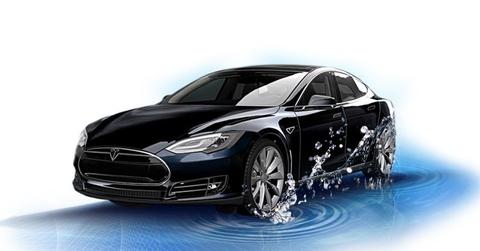'Project Hesla' Is The World's First Hydrogen-Powered Tesla
Tesla may never have an official vehicle that uses hydrogen fuel cells, but that didn't stop a Netherlands gas supplier from adding it to a customized Model S. It doubled the range, but there's still significant costs with the technology.
Updated May 18 2019, 6:26 a.m. ET
Elon Musk has made it pretty clear that he believes using hydrogen fuel cells as an alternative for vehicles isn’t the right option when it comes to moving forward with green energy. However, this hasn’t stopped many automakers from still pursuing the technology on their own. It’s also led to one of Musk’s very own Teslas getting the hydrogen treatment by a Netherlands gas supplier. The result? A vehicle with double the original range.
Using alternative hydrogen fuel cells has been a controversial topic for years. Musk doesn’t even consider it debatable, calling the solution “an incredibly dumb one to pick.” He argues that it’s difficult to store hydrogen inside of a car and claims that it runs at half the efficiency of batteries. Of course, multiple automakers, like Toyota and GM, have still pursued hydrogen fuel cell vehicles.
Despite inefficiencies and expense concerns, General Motors plans to release 20 electric vehicles that run on both battery and fuel cells by 2023. There’s some potential to create cheaper fuel cells with a new method to release hydrogen from seawater. Ultimately, battery-powered electric vehicles are expected to have a bigger share of the market than the hydrogen alternative.
These projections didn’t stop one company from tinkering with Tesla’s vehicles. The Holthausen Group was able to supplement a Tesla Model S with hydrogen power, calling it “Project Hesla.” While the electrical part of the vehicle was not altered, they added lightweight hydrogen tanks and the infrastructure needed to make it work.
Through two power sources that were fully charged, the modded vehicle was able to reach approximately 620 miles in range. This would easily solve the problem with limited mileage in EVs today. However, engineers not only admitted that it was a difficult project to achieve, but it would likely add $58,000 US to the Model S. The vehicle already has a retail price of around $80,000 US.
In order for hydrogen fuel cells to be worth it, the infrastructure has to improve. Battery recharging stations are becoming more accessible and easier to find, but hydrogen fueling stations are still very limited across the United States. In fact, only a handful are found outside of California. However, just like we’ve found some cheaper ways to create hydrogen, companies like Toyota believe that hydrogen fuel cell vehicles will be on par with hybrids by 2025.
Tesla, expectedly, was not involved in the making of “Project Hesla.” Knowing Musk’s stance on hydrogen fuel cells, there will likely never be an official vehicle under the Tesla umbrella with the technology. Perhaps it’ll be better served in public transportation and automation than with personal use.
"Where hydrogen would make sense is where high-capacity electric cars are already making the most sense, which is in super-controlled, standardized environments," Karl Brauer, executive publisher for Autotrader and Kelley Blue Book, told CNBC. “Hydrogen may never make sense for consumer vehicles...but it does make sense for B2B and B2C vehicles that do community standardized shuttling and personal transportation services.”

-1510171123230-1510171126302.jpg)